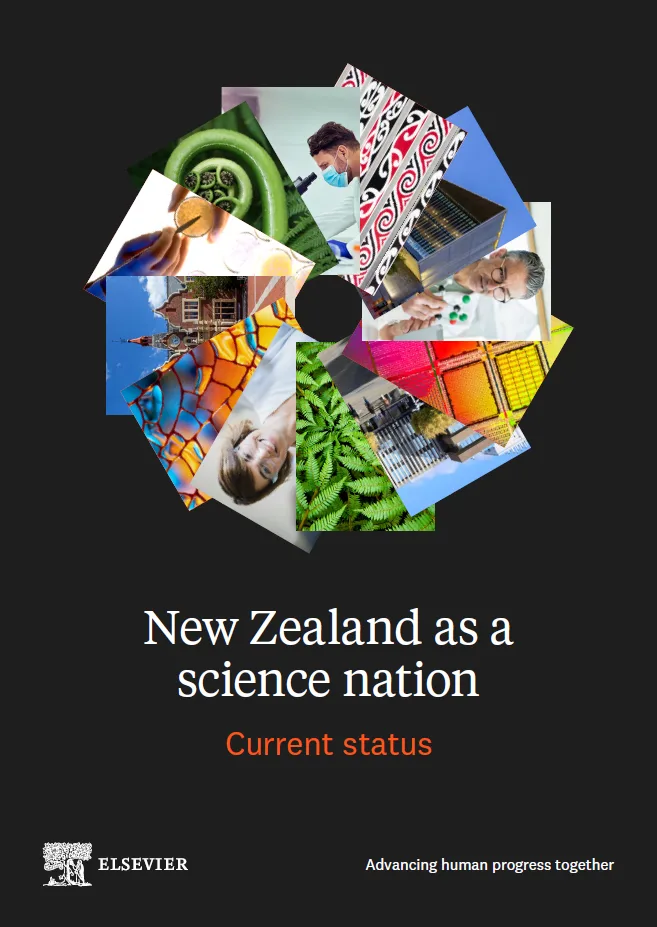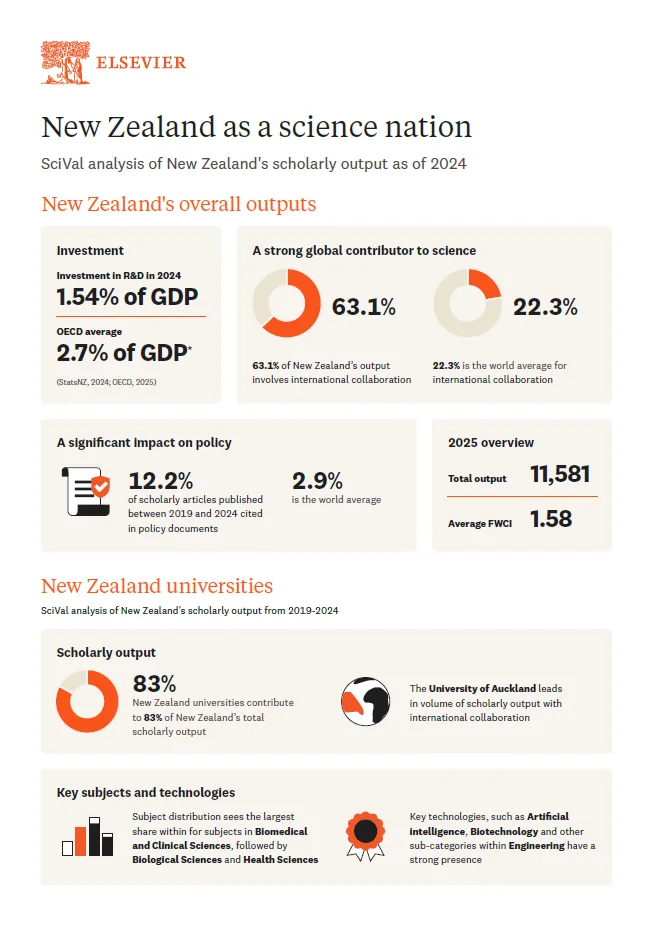New Zealand: Punching above its weight as a science nation
17 September 2025 | 15 min read

nazar_ab via Getty Images
New report delivers insights into the outsized impacts of country’s research mission.
New Zealand, with just over 5 million residents and geographically distant from many of the world’s major science and technology hubs, might not seem an obvious scientific powerhouse. Yet a new report from Elsevier reveals a nation whose scientific contributions exceed expectations. As the country embarks on a sweeping restructuring of its research and innovation system, the findings offer a timely baseline—and a challenge to policymakers and institutions aiming to future-proof New Zealand’s science footprint.
“New Zealand is in the process of a fundamental transition in its science and innovation system,” Sir Peter Gluckman, director of Koi Tū: Centre for Informed Futures at the University of Auckland and chair of the Science System Advisory Group, writes in the report’s preface. “This timely report provides important insights showing how effective and efficient the science community has been, despite comparatively low funding levels.”
The report, produced between March and August 2025, examines current scholarly output and achievements in New Zealand’s science system. Based on Elsevier’s Scopus and SciVal databases and the external Overton database, researchers analyzed more than 150,000 articles published between 2000 and 2024 (with a focus on 2020-24) by New Zealand authors, as well as patents and policy document citations as a proxy for broader impact.

New Zealand: punching above its weight as a science nation
Read the reportKey Findings
Productivity
While accounting for only 0.07% of the world’s population and investing just 1.54% of GDP in research and development (below the OECD average of 2.7%), New Zealand produces 0.4% of global scholarly output. Measured by Field-Weighted Citation Impact (FWCI)—which normalizes for discipline, publication type and year—New Zealand achieves a score of 1.58, meaning its research is cited 58% more than the world average. The country’s science system is recognized for supporting national prosperity and security, with strengths in biotechnology, marine science and environmental research.
International Collaboration
Despite its geographical separation, New Zealand is highly involved in international research. About 62.5% of New Zealand’s scholarly output involves international collaborations, significantly higher than the world average of 21%, the EU27 at 43% and the United Kingdom at 58%. These internationally co-authored publications have nearly twice the world average academic impact, with an FWCI of 1.91.
Policy Impact
About 11.8% of scholarly articles published between 2019 and 2024 were cited in policy documents, compared with a world average of 3.9%. This indicates New Zealand’s research is actively informing government decision-making, particularly in climate change and clinical health.
Support for Sustainable Development Goals
New Zealand shows notable engagement in United Nations Sustainable Development Goals, especially Life Below Water (Goal 14) and Life on Land (Goal 15). Approximately 48% of New Zealand’s research aligns with the SDGs, surpassing the global and EU averages of 33%.
Industry-Academia Collaboration
Industry engagement remains a weak point. Academic-corporate co-publications stand at just 3.6%, one of the lowest rates among comparable small, advanced economies. The restructuring of Crown Research Institutes into Public Research Organizations is seen as a potential catalyst for greater cross-sector impact.
Technological Research
While New Zealand performs well in biotechnology, its research activity in artificial intelligence and clean energy lags behind leaders such as China, the United States and Singapore.
Restructuring for the Future
The full scholarly potential of the Crown Research Institutes has been limited by “poor financial performance and an over-reliance on Crown funding,” according to Science, Innovation and Technology Minister Judith Collins (RNZ News, 2025). Merging institutes into Public Research Organizations, such as NIWA and GNS Science focusing on Earth science, is expected to improve financial stability and research output.
The findings highlight the unique ways New Zealand leverages its geography, environment and scientific strengths. Professor Emeritus Aidan Byrne, chair of the MBIE Science Board, notes: “This physical and social geography has shaped the way New Zealand has developed and implemented its scientific research system, particularly in the context of geographical separation.”
Looking Ahead
The report concludes that New Zealand’s scientific future is bright, but depends on its ability to adapt to evolving global dynamics, leverage collaborations—both international and cross-sector—and invest in key technology areas.
With the university sector accounting for 83% of New Zealand’s scholarly output, Dawn Freshwater, vice chancellor of the University of Auckland, sums up the collective ambition: “Universities are committed to a future-focused, relevant and impactful role as part of a recharged and reformed research and science ecosystem. International collaborations are essential to maximize this, creating strength and the potential to deliver world-leading outcomes with reach well beyond New Zealand.”
Discover other science nation reports: The Netherlands as a Science Nation Germany as a Science Nation

INFOGRAPHIC: New Zealand as a science nation
Read the factsContributors
Anders Karlsson
Vice President, Global Strategic Networks, Elsevier, Japan
Anders Karlsson, PhD, joined Elsevier in 2012 as VP Global Strategic Networks for Asia Pacific. Before, he was Counselor for Science and Innovation at the Swedish Embassy in Tokyo for five years. Since March 2023, he serves on the board of the Swedish Foundation for Internationalization of Higher Education and Research (STINT) and is a steering committee member of the International Network for Govermental Science Advice (INGSA) Asia. In June 2024, he joined the board of Toyo Solar Inc. (NASDAQ). Until Nov 2024, he chaired the Japan chapter of the trade body for Science, Technology and Medical Publishers (STM). Formerly a Quantum Photonics professor at KTH, he led an EU consortia on quantum information technology awarded the EU René Descartes Research Prize. He has held visiting and advisory roles at global institutions, such as Stanford University, Ecole Polytechnique Paris, and Osaka University. He holds a PhD in Electrical Engineering and MSc in Engineering Physics from the Royal Institute of Technology KTH, Sweden.

Karlsson Anders
Mia Yamakawa Lewis
Global Strategic Networks Associate and Academic Relations Manager, Elsevier, Japan
Mia Yamakawa Lewis joined Elsevier in 2025, as Global Strategic Networks Associate and Academic Relations Manager for Asia Pacific, based in Tokyo, Japan, where she before joining Elsevier started her corporate career in communications and IT consulting. She focuses on customer engagement and strategic data analysis to advise government and academic sectors. Since joining Elsevier, she has co-authored several analytical reports highlighting internationally collaborative research and extends her role in creating strategic networks through event management and planning. She has a Masters in Public Policy and International Relations from the University of Tokyo (MA), which facilitated an exchange semester at Seoul National University. She completed her Bachelors Degree with First Class Honours in International Relations at King’s College London.

Mia Yamakawa Lewis